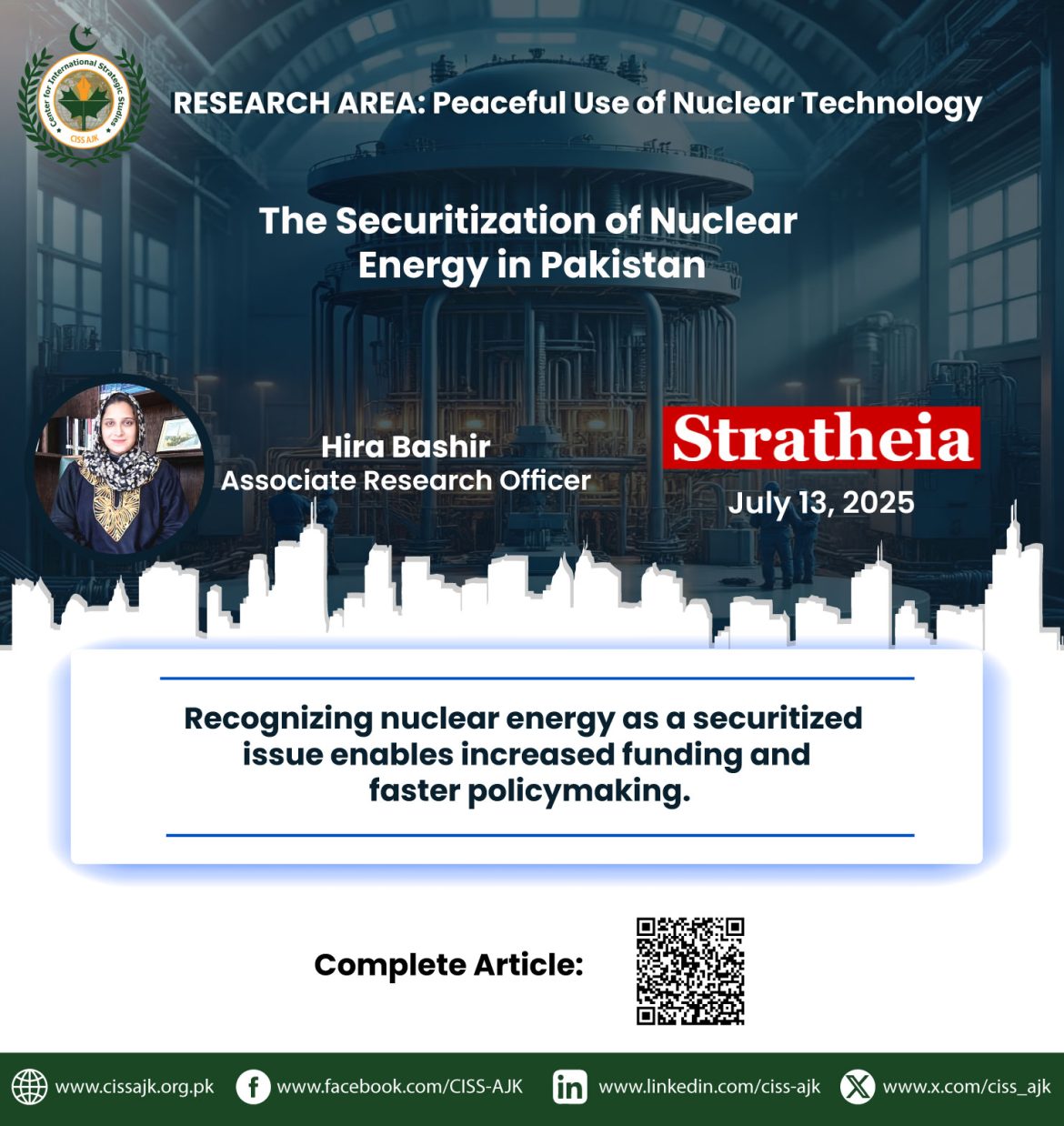Securitization elevates nuclear energy to a national security priority, beyond military applications.
In Pakistan, though, despite the country being able to harness nuclear power, little use of nuclear energy has been made and nuclear power contributes only 17 percent to the national grid. To overcome this gap, the theory of securitization provides a new method, as this theory gives priority to the consideration of nuclear energy as a strategic asset, but it also proposes nuclear energy as a significant part of human security.
The conceptualization of securitization by the Copenhagen School gives some theoretical tools to comprehend how some issues can go up to the national security agenda. The concept of securitization can be explained simply as the act of defining a topic, in this case energy insecurity, as a life-or-death issue, followed by the allocation of some extraordinary action and resources to deal with it. The implementation of this idea on nuclear energy in Pakistan implies the abandonment of the traditional view of nuclear energy as the primary source of military power and its establishment as a significant method of securing energy reliability, economic well-being, and ecological viability.
According to a recent Comprehensive National Security Policy (CNSP) 20222-2026 of Pakistan, human-centric energy security is the centre-piece of dealing with non-traditional security issues. Nevertheless, up to this day, the sphere of nuclear energy in the country is almost restricted to the civilization goals of the defense. This shortsighted attitude decreases the possibilities of applying nuclear energy to solve such important issues as the lack of energy, economic growth, and environmental problems. The securitizing of nuclear energy would mean the acknowledgement of the role that this form of energy would play in the national building and the well-being of the people, hence facilitating the required policy adjustments as well as the redistribution of resources to increase the production of nuclear energy.
Presenting nuclear energy as a national security issue, Pakistan would normalize it politically, bringing it to the same level of priority as the defense and counterterrorism policy. The change would open a new series of positive attributes, including the boosting of funding on the nuclear energy projects, the acceleration of the policy-making process, and the improvement of cooperation between military and civil organizations. It will also make sure that nuclear energy will contribute significantly to the realisation of such long-term objectives as sustainable growth and climate change mitigation.
Nuclear power can reduce reliance on costly, polluting fossil fuels and enhance energy independence.
Although nuclear energy has great potential, in Pakistan, there are associated challenges such as the concerns of the people in regard to health hazards, environmental factors, costly investments in technologies, and infrastructure requirements. All these problems can, however, be solved through the process of securitization. Taking nuclear energy as an immediate matter of national security, Pakistan could be in a position to allocate the required resources and skills to tame these fears to ensure that nuclear energy provides the energy backbone of the country, with no threat to the lives of the citizens and the environment.
Moreover, incorporating nuclear energy into human security discourse would assist Pakistan in overcoming its excessive dependence on imports of fossil fuel and minimize the economic implications of fluctuating energy markets. Nuclear energy holds the promise of offering a clean low low-carbon source of electricity, which helps achieve energy independence and economic diversification. In addition, by developing Small Modular Reactors (SMRs), Pakistan would have the ability to grow its nuclear capacity cost-effectively, especially in locations where access to the grid is low.
Securitization of nuclear energy in Pakistan is a potent means to resolve the energy crisis in the nation, besides encouraging human security. Pakistan can maximize its potential nuclear resource by changing the focus of the nuclear resource from a military resource to nuclear energy as part of economic development, welfare, as well as in the sustainability of the environment.
Challenges like public health concerns and infrastructure costs can be addressed through prioritized resource allocation.
This would not only enhance energy security but also help achieve the wider targets of sustainable development, mitigating climate change, as well as economic resilience. However, to attain that, Pakistan should consider taking a comprehensive approach where nuclear energy would be integrated into the Pakistani discourse on a national security issue and should be treated as a decisive factor towards the future of the state and its citizens.
Disclaimer: The opinions expressed in this article are solely those of the author. They do not represent the views, beliefs, or policies of the Stratheia.



